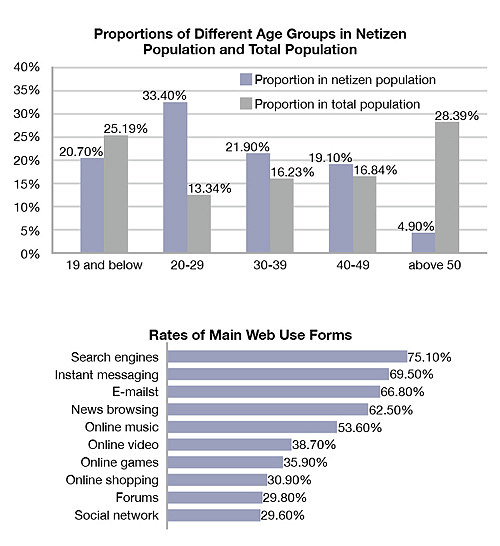|
A media market investigation by CVSC-TNS Research, the largest media and marketing research company in China, shows as far as average viewing time is concerned, the Internet surpassed newspapers, magazines and radio in 2008, becoming China's second largest means of mass communication next to TV. The Guangming Daily survey shows Internet users now take up time previously reserved for various other media. Of those surveyed, 68.5 percent say they have reduced radio listening time, 66.9 percent, 63.2 percent and 60.7 percent cut reading time for magazines, newspapers and books respectively, and 58.7 percent cut TV watching time.
Online activities
Promoted by rapidly developing Web technologies and expanding market demand, use of the Internet extends into all levels of Chinese life.
Search engines are being used widely. The survey shows the utilization rate reaches 75.1 percent, the first of 24 common Web use forms. It's also a preference of young surfers, as 41.1 percent of teenagers and 36.4 percent of young people aged at 20 to 29 "always" use search engines when online. The percentage of those above 50 years old is only 18.7.
With the help of instant messaging (IM), social network on the Internet has grown rapidly in recent years. The survey shows 95.8 percent of Chinese surfers use IM tools such as QQ, MSN, and Google Talk, and 69.5 percent of them "often" or "always" chat online; this is especially the case among teenagers, who also use accessional functions.
Nowadays, the enthusiastic participation of netizens in discussing public affairs plays an important role in China's democratic political construction. Internet forums characterized by openness, equality and interaction have provided a new type of platform for Chinese to participate in political life—91.1 percent of surfers have joined discussions in the Internet forums and 29.8 percent of them "often" log in to various forum sites. BBS (bulletin board system) users are mostly composed of urban people in the age-bracket of 20-39. In comparison with other netizen groups, a greater number of male users and those of higher educational levels post messages and comments to give opinions.
Shopping is another function of the Internet frequently employed by surfers. As its transaction became gradually standardized, online shopping, which is without the limitations of time and space, has been accepted by more and more people, especially well-educated, high-income young people in cities. Of the surveyed, 30.9 percent said they "often" go shopping on the Internet, while 69.4 percent say they've become accustomed to this convenient way of searching for possible purchases. In many cases other customers' online comments play a key role in helping them make a final decision.
Enjoying entertainment services provided by the Internet is also an important part of netizen life. The survey shows young urban surfers are frequent visitors to video websites, while high school students constitute a considerable part of online game players.

|
